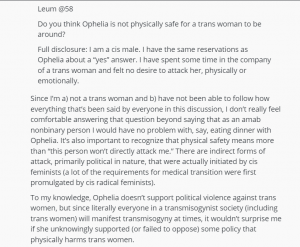I wrote a column for the Freethinker a couple of days ago about Shakespeare and undermotivated evil, via Hamlet and then Iago, with an observation on one way Shakespeare violated the conventions of his time.
There’s one Shakespeare character, though, who stands out for the flimsiness of his stated reasons compared to the malice and cruelty of what he does. He’s pissed off that he didn’t get a promotion, maybe possibly his wife has the hots for Othello. Othello is a good guy and that makes Iago look bad – blah blah. He claims all these at different times, so they cancel each other out, and seem like rationalizations instead of reasons. Really he just does it because he wants to, and he can. Desdemona and Othello are happy, so he’ll make them not happy, and not alive either.
It’s interesting how he goes about it, because it’s a classic literary theme, especially popular in Shakespeare’s time but still pervasive. It’s the theme that’s behind the phenomenon of “honour” killings. It’s all that, except that Shakespeare does what no one else does, and turns the theme on its head.
The theme is the happily married man who discovers that his wife is a whore. Remember the frame narrative of The 1001 Nights? It’s that. The Agamemnon? That. Most of Elizabethan and Jacobean revenge tragedies? That.
Shakespeare used the theme in several of his plays, but in nearly all of his, the jealous husband is wrong. The later the play, the more wrong the jealous husband is. By the time we get to A Winter’s Tale, he’s such a jackass that he makes up the story that his wife is cheating on him out of thin air.
Have you ever noticed that? I was helped to realize it by reading a lot of Shakespeare’s contemporaries: with them the husband was never wrong, the wife was always a whore. Given what Shakespeare did with that theme, I have a feeling he found the theme annoying. That’s odd, isn’t it.
Othello is nudged into it by Iago, but he’s nearly as bad. He believes the poison Iago tells him, and he refuses to trust Desdemona – and that’s bad.
It’s so bad that Shakespeare gives the job of telling him off to a woman, Iago’s wife. It’s a violation of every possible Jacobean convention: she is officially Othello’s inferior in every way – married to his subordinate, and a woman. Yet she denounces him, and not only that, she addresses him as “thou” – the most insultingly outrageous thing a subordinate can do. She goes from “you” to “thou” in an instant, when he calls Desdemona a whore.
OTHELLO: She’s, like a liar, gone to burning hell:
‘Twas I that kill’d her.
EMILIA: O, the more angel she,
And you the blacker devil!
OTHELLO: She turn’d to folly, and she was a whore.
EMILIA: Thou dost belie her, and thou art a devil.
– Act 5, scene 2
See that? Phewwwww that’s some outrageous behavior. Thou is for intimates, but it’s also for subordinates. However intimate they may be, a subordinate mustn’t thou a superior. Falstaff does it to Hal, if I remember correctly, but that’s part of Falstaff’s transgressiveness. Horatio never thous Hamlet, despite their deep friendship. Falstaff is being a bad boy. Emilia’s not doing that, she’s doing something much fiercer.
Shakespeare liked the effect he did it all over again in The Winter’s Tale.
Act 3 scene 2:
Leontes, the king, has accused his wife Hermione of adultery in court, then news arrives that their young son has died of grief, then Hermione faints and is carried out (the guy rushes things in this scene, I have to say) – and her attendant, Paulina, goes with her, then in a few minutes (during which Leontes berates himself for being such a shithead) she comes back. She’s a high class servant – upper class, but a servant to the royals – and she lets the king have it:
[Re-enter PAULINA]
- Paulina. Woe the while!
O, cut my lace, lest my heart, cracking it,
Break too.
- Paulina. What studied torments, tyrant, hast for me?
What wheels? racks? fires? what flaying? boiling?
In leads or oils? what old or newer torture
Must I receive, whose every word deserves
To taste of thy most worst? Thy tyranny
Together working with thy jealousies,
Fancies too weak for boys, too green and idle
For girls of nine, O, think what they have done
And then run mad indeed, stark mad! for all
Thy by-gone fooleries were but spices of it.
That thou betray’dst Polixenes,’twas nothing;
That did but show thee, of a fool, inconstant
And damnable ingrateful: nor was’t much,
Thou wouldst have poison’d good Camillo’s honour,
To have him kill a king: poor trespasses,
More monstrous standing by: whereof I reckon
The casting forth to crows thy baby-daughter
To be or none or little; though a devil
Would have shed water out of fire ere done’t:
Nor is’t directly laid to thee, the death
Of the young prince, whose honourable thoughts,
Thoughts high for one so tender, cleft the heart
That could conceive a gross and foolish sire
Blemish’d his gracious dam: this is not, no,
Laid to thy answer: but the last,—O lords,
When I have said, cry ‘woe!’ the queen, the queen,
The sweet’st, dear’st creature’s dead,
and vengeance for’t
Not dropp’d down yet.
A torrent of thous, coupled to the harshest of insults – from a woman and a servant, to the king.
That dude Shakespeare was up to something.
(This is a syndicated post. Read the original at FreeThoughtBlogs.)
@mtaibbi


